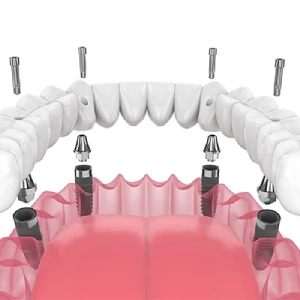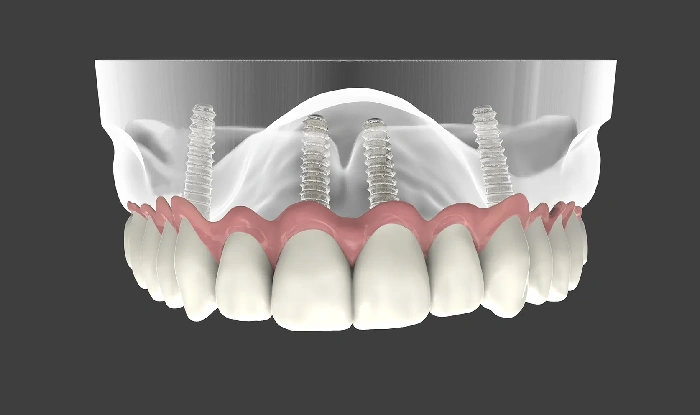All-on-4 dental implants have become a revolutionary solution for patients who have lost most or all of their teeth. They offer stability, aesthetic appeal, and the convenience of fixed prosthetic teeth without needing individual implants for each missing tooth. But one of the most common questions patients ask is, “How long do all-on-4 implants last?”
In this detailed guide, we’ll explore the expected lifespan of All-on-4 implants, what factors influence their longevity, and how to ensure they serve you well for decades.

Understanding All-on-4 Implants: What Makes Them Unique
Unlike traditional dentures, All-on-4 implants use four strategically placed implants to support a full arch of replacement teeth. This innovative approach minimizes the need for bone grafting while supporting a natural-looking and functional smile.
Key Benefits of All-on-4 Implants Include
- Fixed, non-removable teeth
- Immediate function (in most cases)
- Reduced treatment time and cost
- Improved bone preservation and facial aesthetics
While the technology is advanced and reliable, understanding its durability requires examining how the implants interact with the jawbone and surrounding structures over time.
How Long Do All-on-4 Implants Last on Average?
With proper care and regular dental check-ups, the titanium implant posts used in All-on-4 procedures can last 20 years or more and often last a lifetime.
However, the prosthetic teeth (the denture or bridge attached to the implants) typically need replacement or refurbishment every 10 to 15 years, depending on wear and tear.
Lifespan Breakdown
Component |
Average Lifespan |
| Implant posts (titanium) | 20+ years to lifetime |
| Prosthetic teeth (bridge) | 10-15 years |
Factors That Affect the Longevity of All-on-4 Implants
Oral Hygiene Habits
Even though implants are not susceptible to decay, the surrounding gums and bone are still vulnerable to peri-implantitis, a gum infection similar to periodontal disease. Poor oral hygiene can shorten the lifespan of both the implants and prosthetics.
Tip: Brush twice daily, floss (or use a water flosser), and follow your dentist’s cleaning instructions.
Dental Check-Ups and Professional Cleanings
Routine visits to your dentist help detect issues early, such as loosening prosthetics, gum inflammation, or wear and tear on the bridge.
Tip: Schedule cleanings and exams every 6 months, or as recommended.
Lifestyle and Habits
Habits such as smoking, heavy alcohol use, or teeth grinding (bruxism) can increase the risk of implant failure.
Tip: Quit smoking and discuss solutions for bruxism (such as night guards) with your dentist.
Bone Health and Jaw Stability
The success of All-on-4 implants depends on healthy jawbone density. Patients with osteoporosis or uncontrolled diabetes may face challenges that affect implant longevity.
Tip: Maintain good overall health and manage systemic conditions proactively.
Quality of Prosthetic Materials The materials used for the bridge (acrylic vs. porcelain) also impact durability. Porcelain bridges, though costlier, are more resistant to staining and wear.
Tip: Discuss the best prosthetic material options with your dentist based on your lifestyle and budget.
Can All-on-4 Implants Fail?
While All-on-4 implants boast a success rate of over 95%, failures can occur. Common reasons include:
- Poor oral hygiene leading to peri-implantitis
- Insufficient bone integration (osseointegration failure)
- Excessive bite forces or trauma
- Uncontrolled systemic health conditions
Early detection and prompt intervention can often resolve issues and prolong the life of your implants.
How to Make Your All-on-4 Implants Last Longer?
If you want to maximize the lifespan of your All-on-4 implants, follow these essential guidelines:
- Commit to excellent oral hygiene
- Visit your dentist regularly
- Avoid smoking and manage systemic diseases
- Protect your implants with a night guard if needed
- Maintain a healthy, balanced diet
Remember, while the implants are incredibly durable, the prosthetic teeth will naturally experience wear and tear, just like natural teeth.
Conclusion: Durable, Dependable, and Long-Lasting When Cared For Properly
So, how long do all-on-4 implants last? The titanium posts can last a lifetime in ideal conditions, while the prosthetic teeth may need replacement every 10 to 15 years. Your commitment to oral hygiene, professional care, and healthy lifestyle choices plays a vital role in protecting your investment.
By partnering with a trusted dental team like Centers for Dental Implants, you can enjoy a confident smile that lasts for decades. Our experienced team will guide you through every step of your All-on-4 journey — from placement to long-term care.
Ready to Transform Your Smile?
If you’re considering All-on-4 dental implants or want expert advice on maintaining your existing implants, Centers for Dental Implants is here to help.
Call us today or Book your consultation at one of our three Florida locations: Aventura, Hallandale Beach, or Pembroke Pines.
FAQs
Do All-on-4 implants last a lifetime?
With proper care, the titanium implant posts can last a lifetime, while the prosthetic teeth usually need replacement every 10-15 years.
What happens if my All-on-4 prosthetic wears out?
Your dentist can replace or refurbish the prosthetic bridge while leaving the implants intact.
Can I eat normally with All-on-4 implants?
Yes, once healed, you can enjoy most foods. However, avoid very hard or sticky items to protect the prosthetic teeth.
How do I clean All-on-4 implants?
Brush twice daily, use floss or interdental brushes, and visit your dentist for professional cleanings.
Are All-on-4 implants prone to failure?
With a success rate over 95%, failures are rare but possible. Following proper care guidelines minimizes risks.

